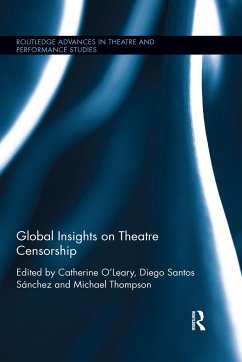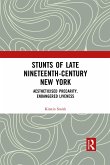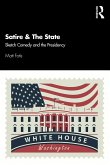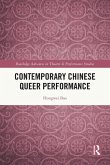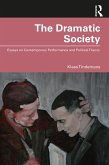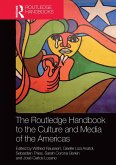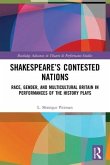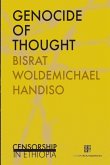Global Insights on Theatre Censorship
Herausgeber: O'Leary, Catherine; Thompson, Michael; Sánchez, Diego
Global Insights on Theatre Censorship
Herausgeber: O'Leary, Catherine; Thompson, Michael; Sánchez, Diego
- Broschiertes Buch
- Merkliste
- Auf die Merkliste
- Bewerten Bewerten
- Teilen
- Produkt teilen
- Produkterinnerung
- Produkterinnerung
Over a range of countries and political regimes, this book examines forms of theatre censorship in the 20th and 21st centuries. It revisits assumptions about prohibition and state control, examining theatre censorship as a continuum ranging from the unconscious self-censorship built into social structures and discursive practices, through bureau
Andere Kunden interessierten sich auch für
![Stunts of Late Nineteenth-Century New York Stunts of Late Nineteenth-Century New York]() Kirstin SmithStunts of Late Nineteenth-Century New York56,99 €
Kirstin SmithStunts of Late Nineteenth-Century New York56,99 €![Satire & The State Satire & The State]() Matt FotisSatire & The State53,99 €
Matt FotisSatire & The State53,99 €![Contemporary Chinese Queer Performance Contemporary Chinese Queer Performance]() Hongwei BaoContemporary Chinese Queer Performance58,99 €
Hongwei BaoContemporary Chinese Queer Performance58,99 €![The Dramatic Society The Dramatic Society]() Klaas TindemansThe Dramatic Society48,99 €
Klaas TindemansThe Dramatic Society48,99 €![The Routledge Handbook to the Culture and Media of the Americas The Routledge Handbook to the Culture and Media of the Americas]() The Routledge Handbook to the Culture and Media of the Americas60,99 €
The Routledge Handbook to the Culture and Media of the Americas60,99 €![Shakespeare's Contested Nations Shakespeare's Contested Nations]() L Monique PittmanShakespeare's Contested Nations56,99 €
L Monique PittmanShakespeare's Contested Nations56,99 €![Genocide of thought: Censorship in Ethiopia Genocide of thought: Censorship in Ethiopia]() Bisrat Woldemichael HandisoGenocide of thought: Censorship in Ethiopia9,49 €
Bisrat Woldemichael HandisoGenocide of thought: Censorship in Ethiopia9,49 €-
-
-
Over a range of countries and political regimes, this book examines forms of theatre censorship in the 20th and 21st centuries. It revisits assumptions about prohibition and state control, examining theatre censorship as a continuum ranging from the unconscious self-censorship built into social structures and discursive practices, through bureau
Produktdetails
- Produktdetails
- Verlag: CRC Press
- Seitenzahl: 304
- Erscheinungstermin: 18. Dezember 2020
- Englisch
- Abmessung: 229mm x 152mm x 16mm
- Gewicht: 408g
- ISBN-13: 9780367737863
- ISBN-10: 0367737868
- Artikelnr.: 69893986
- Verlag: CRC Press
- Seitenzahl: 304
- Erscheinungstermin: 18. Dezember 2020
- Englisch
- Abmessung: 229mm x 152mm x 16mm
- Gewicht: 408g
- ISBN-13: 9780367737863
- ISBN-10: 0367737868
- Artikelnr.: 69893986
Catherine O'Leary is Reader in Spanish at the University of St Andrews (UK). She was the Co-Investigator on the Theatre Censorship in Spain, 1931-1985 project funded by the UK Arts and Humanities Research Council (2008-2011) and co-organiser of the Art Made Tongue-Tied by Authority: Theatre Censorship around the World conference. Catherine has published widely on contemporary Spanish theatre and censorship. Her works include a monographical study of the theatre of Antonio Buero Vallejo (Tamesis, 2005) and, more recently, articles on Fernando Arrabal (JILAR, 2008), Antonio Buero Vallejo (Bulletin of Spanish Studies, 2011), Sean O'Casey (ADE Teatro , 2012) and Carlota O'Neill (Bulletin of Spanish Studies, 2012). She has also published on women's writing and on memory. Diego Santos Sánchez is Alexander von Humboldt Researcher at the Institut für Romanistik, Humboldt University of Berlin (Germany). His work focuses on 20th-century Spanish theatre. He is the author of El teatro pánico de Fernando Arrabal (The Panic Theatre of Fernando Arrabal) (Tamesis, 2014) and numerous articles on theatre censorship and exile during the Franco regime. He has participated in various research projects on these topics, including Theatre Censorship in Spain, 1931-1985 at Durham University (funded by the Arts & Humanities Research Council, UK), for which he was Research Associate. In addition, he is founding President of BETA: Asociación de Jóvenes Doctores en Hispanismo and Editorial Board Member of 452ºF: Journal of Literary Theory and Comparative Literature. Michael Thompson is Senior Lecturer in Hispanic Studies at Durham University (UK). He was the Principal Investigator on the Theatre Censorship in Spain, 1931-1985 project funded by the UK Arts and Humanities Research Council (2008-2011) and co-organiser of the Art Made Tongue-Tied by Authority: Theatre Censorship around the World conference. He is the author of Performing Spanishness: History, Cultural Identity and Censorship in the Theatre of José María Rodríguez Méndez (Intellect, 2007), and has published numerous articles and book chapters on Spanish theatre and censorship. He is also interested in theatre translation and is co-author of the second edition of the textbook Thinking Spanish Translation (Routledge, 2009).
Foreword by Lisa Appignanesi Introduction: Censorship and Creative Freedom
Catherine O'Leary Part I: First-Hand Experiences of Censorship 1. The
Dictator's Gift of Censorship Fernando Arrabal 2. The Strategy of Communist
Censorship in Poland towards the Most Critical and Subversive Student
Theatre Productions of 1978 and 1979 Juliusz Tyszka 3. Between the Silence
of Submission and the Challenges of Authenticity: Theatrical Censorship in
Franco's Spain (1939-75) Patricia W. O'Connor 4. Theatre Censorship in
South Asia: Hegemony and AmbivalenceAbhi Subedi 5. Silence One Story and
Another is Born: Experience of Censorship in Iran and the UK in 2010 Lisa
Goldman Part II: Censorship in Authoritarian Regimes 6. Who was Afraid of
Fernando Arrabal? The Architect and the Emperor of Assyria in Yugoslavia
Denis Poni 7. Hide and Seek: Selected Stratagems of Polish Independent
Theatre Companies Joanna Ostrowska 8. Der Georgsberg: The Economy as
Theatre in the German Democratic Republic Barrie Baker 9. Bowdlerised
Shakespeare Productions in Hungary and Portugal Zsófia Gombár 10. Theatre
Censorship in Portugal during the Estado Novo: Policies, Censors,
Organisation and Procedures Ana Cabrera 11. An Overview of Theatre
Censorship in Brazil (1925-1970) Mayra Rodrigues Gomes & Eliza Bachega
Casadei 12. Mapping Translated Theatre in Spain through Censorship Archives
Raquel Merino Álvarez 13. Regime Loyalty and Rebellion: Re-Inventing the
Colonial Censorship Nightmare in Zimbabwe Praise Zenenga Part III:
Censorship in Democratic States 14. Stage Irish Neutrality: Theatre
Censorship during the 'Emergency', 1939-45 Donal Ó Drisceoil 15. Not
Recommended for Licence: British Theatre Censorship under the Lord
Chamberlain Steve Nicholson 16. Freedom of Speech and Hair: The Legal
Legacy John H. Houchin 17. Anthony Neilson's Stitching and the High Moral
Ground: A Case Study from Malta Vicki Ann Cremona Conclusion: The Power of
Theatre Michael Thompson
Catherine O'Leary Part I: First-Hand Experiences of Censorship 1. The
Dictator's Gift of Censorship Fernando Arrabal 2. The Strategy of Communist
Censorship in Poland towards the Most Critical and Subversive Student
Theatre Productions of 1978 and 1979 Juliusz Tyszka 3. Between the Silence
of Submission and the Challenges of Authenticity: Theatrical Censorship in
Franco's Spain (1939-75) Patricia W. O'Connor 4. Theatre Censorship in
South Asia: Hegemony and AmbivalenceAbhi Subedi 5. Silence One Story and
Another is Born: Experience of Censorship in Iran and the UK in 2010 Lisa
Goldman Part II: Censorship in Authoritarian Regimes 6. Who was Afraid of
Fernando Arrabal? The Architect and the Emperor of Assyria in Yugoslavia
Denis Poni 7. Hide and Seek: Selected Stratagems of Polish Independent
Theatre Companies Joanna Ostrowska 8. Der Georgsberg: The Economy as
Theatre in the German Democratic Republic Barrie Baker 9. Bowdlerised
Shakespeare Productions in Hungary and Portugal Zsófia Gombár 10. Theatre
Censorship in Portugal during the Estado Novo: Policies, Censors,
Organisation and Procedures Ana Cabrera 11. An Overview of Theatre
Censorship in Brazil (1925-1970) Mayra Rodrigues Gomes & Eliza Bachega
Casadei 12. Mapping Translated Theatre in Spain through Censorship Archives
Raquel Merino Álvarez 13. Regime Loyalty and Rebellion: Re-Inventing the
Colonial Censorship Nightmare in Zimbabwe Praise Zenenga Part III:
Censorship in Democratic States 14. Stage Irish Neutrality: Theatre
Censorship during the 'Emergency', 1939-45 Donal Ó Drisceoil 15. Not
Recommended for Licence: British Theatre Censorship under the Lord
Chamberlain Steve Nicholson 16. Freedom of Speech and Hair: The Legal
Legacy John H. Houchin 17. Anthony Neilson's Stitching and the High Moral
Ground: A Case Study from Malta Vicki Ann Cremona Conclusion: The Power of
Theatre Michael Thompson
Foreword by Lisa Appignanesi Introduction: Censorship and Creative Freedom
Catherine O'Leary Part I: First-Hand Experiences of Censorship 1. The
Dictator's Gift of Censorship Fernando Arrabal 2. The Strategy of Communist
Censorship in Poland towards the Most Critical and Subversive Student
Theatre Productions of 1978 and 1979 Juliusz Tyszka 3. Between the Silence
of Submission and the Challenges of Authenticity: Theatrical Censorship in
Franco's Spain (1939-75) Patricia W. O'Connor 4. Theatre Censorship in
South Asia: Hegemony and AmbivalenceAbhi Subedi 5. Silence One Story and
Another is Born: Experience of Censorship in Iran and the UK in 2010 Lisa
Goldman Part II: Censorship in Authoritarian Regimes 6. Who was Afraid of
Fernando Arrabal? The Architect and the Emperor of Assyria in Yugoslavia
Denis Poni 7. Hide and Seek: Selected Stratagems of Polish Independent
Theatre Companies Joanna Ostrowska 8. Der Georgsberg: The Economy as
Theatre in the German Democratic Republic Barrie Baker 9. Bowdlerised
Shakespeare Productions in Hungary and Portugal Zsófia Gombár 10. Theatre
Censorship in Portugal during the Estado Novo: Policies, Censors,
Organisation and Procedures Ana Cabrera 11. An Overview of Theatre
Censorship in Brazil (1925-1970) Mayra Rodrigues Gomes & Eliza Bachega
Casadei 12. Mapping Translated Theatre in Spain through Censorship Archives
Raquel Merino Álvarez 13. Regime Loyalty and Rebellion: Re-Inventing the
Colonial Censorship Nightmare in Zimbabwe Praise Zenenga Part III:
Censorship in Democratic States 14. Stage Irish Neutrality: Theatre
Censorship during the 'Emergency', 1939-45 Donal Ó Drisceoil 15. Not
Recommended for Licence: British Theatre Censorship under the Lord
Chamberlain Steve Nicholson 16. Freedom of Speech and Hair: The Legal
Legacy John H. Houchin 17. Anthony Neilson's Stitching and the High Moral
Ground: A Case Study from Malta Vicki Ann Cremona Conclusion: The Power of
Theatre Michael Thompson
Catherine O'Leary Part I: First-Hand Experiences of Censorship 1. The
Dictator's Gift of Censorship Fernando Arrabal 2. The Strategy of Communist
Censorship in Poland towards the Most Critical and Subversive Student
Theatre Productions of 1978 and 1979 Juliusz Tyszka 3. Between the Silence
of Submission and the Challenges of Authenticity: Theatrical Censorship in
Franco's Spain (1939-75) Patricia W. O'Connor 4. Theatre Censorship in
South Asia: Hegemony and AmbivalenceAbhi Subedi 5. Silence One Story and
Another is Born: Experience of Censorship in Iran and the UK in 2010 Lisa
Goldman Part II: Censorship in Authoritarian Regimes 6. Who was Afraid of
Fernando Arrabal? The Architect and the Emperor of Assyria in Yugoslavia
Denis Poni 7. Hide and Seek: Selected Stratagems of Polish Independent
Theatre Companies Joanna Ostrowska 8. Der Georgsberg: The Economy as
Theatre in the German Democratic Republic Barrie Baker 9. Bowdlerised
Shakespeare Productions in Hungary and Portugal Zsófia Gombár 10. Theatre
Censorship in Portugal during the Estado Novo: Policies, Censors,
Organisation and Procedures Ana Cabrera 11. An Overview of Theatre
Censorship in Brazil (1925-1970) Mayra Rodrigues Gomes & Eliza Bachega
Casadei 12. Mapping Translated Theatre in Spain through Censorship Archives
Raquel Merino Álvarez 13. Regime Loyalty and Rebellion: Re-Inventing the
Colonial Censorship Nightmare in Zimbabwe Praise Zenenga Part III:
Censorship in Democratic States 14. Stage Irish Neutrality: Theatre
Censorship during the 'Emergency', 1939-45 Donal Ó Drisceoil 15. Not
Recommended for Licence: British Theatre Censorship under the Lord
Chamberlain Steve Nicholson 16. Freedom of Speech and Hair: The Legal
Legacy John H. Houchin 17. Anthony Neilson's Stitching and the High Moral
Ground: A Case Study from Malta Vicki Ann Cremona Conclusion: The Power of
Theatre Michael Thompson

